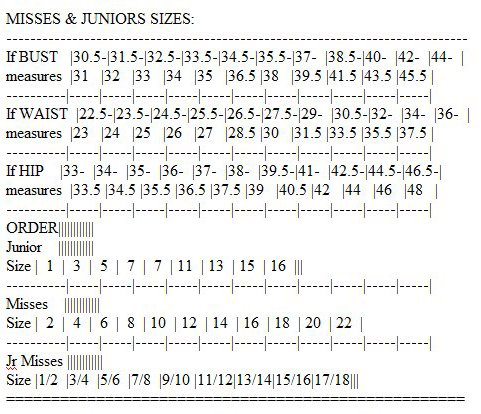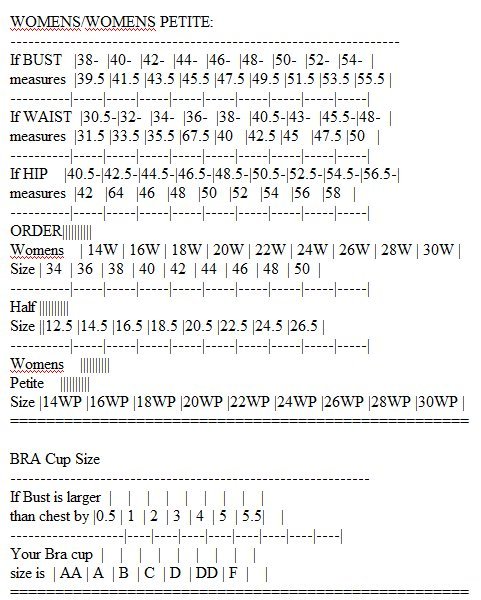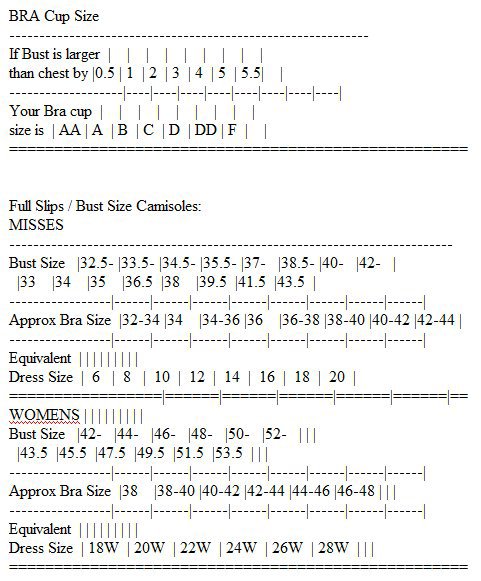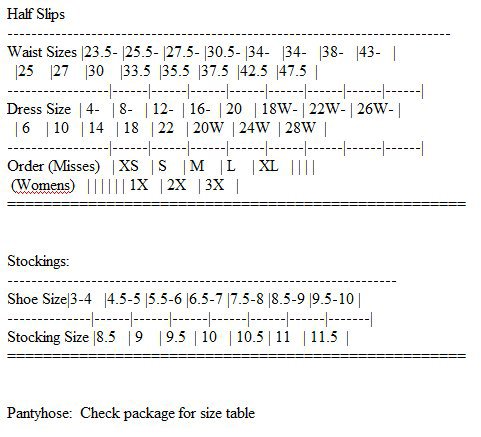| TRANSGENDER ARTICLE SUBMISSIONS: TGGuide is seeking writers for articles of interest to the transgender community. We will include information about the author along with links back to your web site. Please submit your articles to webmaster@tgguide.com. |
Crossdresser Shopping Guide
A Crossdresser SHOPPING GUIDE is published on TGGuide.com with permission of the Author. This article and photographs may not be reprinted without permission of the author.
The following material was put together from several sources including an excellent article by Christina Cross on how to select the best look in clothes for your body shape and size.
Trying to get acquainted with a new set of rules for dressing can be so confusing it may make you throw up your hands and quit. I’ve had ladies ask me many times, “What is the best look for MY body?” When I ask what image they’d like to project invariably the response is “Oh, I want to look pretty.” Of course everyone’s version of “pretty” will vary. Don’t let your clothes be the focal point! Your clothes should enhance the way you feel, the person you are. They should make people notice YOU first, NOT what you are wearing.
I usually advise these ladies to play up what they feel are their best features and play down those features they’d rather not draw attention to. I’ve found the easiest way to start is to consult a basic chart of body variations with suggestions on how to enhance or downplay each.
The chart you’ll find later in this article is really a bare-bones chart, leaving lots of room for experimentation. As a starting point, it serves to give suggestions for elaborating on and applying different tricks to a particular look. Look at what describes your body most closely. Look at the suggestions, combine them and then translate them to your fashion look.
It can be helpful and fun at the same time. Are you looking for a place to find like-minded people in search of friends? Check out our all-new chat network!
Body Variations:
BROAD SHOULDERS
===============
RECOMMENDED:
1). raglan sleeves,
2). dolmen sleeves,
3). V-neck.
4). drop shoulders.
Discouraged:
1). padded shoulders,
2). boat necks,
3). puff sleeves.
NARROW SHOULDERS
================
RECOMMENDED:
1). halter tops
2). small collars,
3). padded shoulders,
4). diagonal lines from shoulder to waist.
Discouraged:
1). turtlenecks,
2). bulky fabrics
LONG WAISTED
============
RECOMMENDED:
1). high-waisted slacks,
2). skirt lengths just below the knee,
3). wide belts,
4). layered look.
Discouraged:
1). hip-hugger pants,
2). low-slung belts
SHORT WAISTED
=============
RECOMMENDED:
1). pants which ride low on waistline,
2). low-slung belts,
3). overblouses falling to inseam.
Discouraged:
1). wide belts,
2). short jackets or blouses,
3). belted overblouses.
THICK WAIST
===========
RECOMMENDED:
1). vests,
2). loose waistlines,
3). hip-slung belts
4). dolmen sleeves,
5). chemise dresses,
6). long tunic over skirt.
Discouraged:
1). wide belts,
2) pleated or gathered skirts.
SMALL WAIST
===========
RECOMMENDED:
1). belts – any kind/style,
2). waist accents
Discouraged:
1). unbelted dresses.
FULL BUST
=========
RECOMMENDED:
1). loose fitting tops,
2). long-sleeved blouses,
3). choker necklaces,
4). V-necks,
5). open necks.
Discouraged:
1). tube tops,
2). tight ribbed knits,
3). patch pockets on shirts,
4). puffy sleeves.
SMALL BUST
==========
RECOMMENDED:
1). flowing blouses,
2). brightly colored blouses,
3). horizontal yokes,
4). padded shoulders.
Discouraged:
1). tight shirts.
SHORT NECK
==========
RECOMMENDED:
1). V-necks,
2). open collars,
3). scoop necks,
4). hanging pendants.
Discouraged:
1). turtlenecks,
2). cowl necks,
3). layered look.
LONG NECK
=========
RECOMMENDED:
1). turtlenecks,
2). cowl necks,
3). layered look,
4). boat neck,
5). scarves and jewelry at neck,
6). one-shouldered dresses.
Discouraged:
1). peter pan collars,
2). scoop necks.
SMALL BODY
==========
RECOMMENDED:
1). simple linear designs,
2). pleated skirts (linear lines),
3). slacks,
4). one color head-to-toe,
5). long sleeves,
6). medium width belts,
7). vertical stripes.
Discouraged:
1). large, busy patterns,
2). horizontal stripes,
3). pegged pants,
4). bulky fabrics,
5). many colors at one time.
SHORT LEGS
==========
RECOMMENDED:
1). vertical stripes,
2). solid colors,
3). mid-calf length skirts and dresses,
4). high-heeled shoes.
Discouraged:
1). pegged pants,
2). hip hugging pants,
3). busy prints or plaids
HEAVY LEGS
==========
RECOMMENDED:
1). straight-leg slacks,
2). boots,
3). just below the knee skirts and dresses,
4). high-heel shoes,
5). dark colored shoes and stockings.
Discouraged:
1). short skirts,
2). tight pants,
3). shoes with straps.
SMALL HIPS
==========
RECOMMENDED:
1). pleated, gathered skirts,
2). chemise dresses,
3). overblouses.
Discouraged:
1). tight skirts,
2). hip-hugging pants,
LARGE HIPS/THIGHS
=================
RECOMMENDED:
1). dark colored skirts and dresses,
2). dark colored hose/shoes,
3). single colored outfits,
4). long tunic over skirt.
Discouraged:
1). large, busy patterns on skirts/pants,
2). horizontal stripes on skirts/pants,
3). brightly colored or plaid skirts or pants,
4). gathered skirts,
5). pants with back pockets.
Remember, as you scrutinize this chart that these are GUIDELINES ONLY. What may not be listed here for your body type may be perfect for the type of look you want to achieve. As you experiment, you’ll become more confident. And, most importantly, confidence is the real key to any successful fashion look.
Feminine Attire and the Male Body
Next, after you have decided what styles will be best suited to you, comes the all important SIZING FEMININE ATTIRE TO THE MALE BODY.
Here we shall discuss the important topic of SIZE. Specifically, how to measure your body and translate the resulting numbers into feminine clothing sizes.
Normally when one shops in a store the known size of the garment guides one to the correct area of the store where the final selection is made by trying the garment on for appearance and comfort.
Experienced shoppers know sizes vary from manufacturer-to-manufacturer, label-to-label, material-to-material and even one time to the next. In other words, clothes sizing is NOT an exact science. The MTF is further handicapped by seeking clothing neither cut nor sized for the male body. Of course the ideal situation is to have feminine clothing styled and fitted by a tailor to your individual body. There are a few tailors available to provide this service.
However, the purpose of this article is to assist the MTF emerging from the dark recesses of his/her closet with the first selection of feminine clothing to provide the best chance of passing in public at an affordable cost. It is assumed this initial selection will be made from a mail order house or possibly at a store WITHOUT trying the garment(s) on prior to purchase.
Obviously the first step in determining your size(s) is to take, and record, your body measurements. It is easier if you have a friend help and if you wear no more then your basic undergarments (bra and panties). Referring to the figure farther on in this article measure the length, in inches, around your body at the following locations: chest, bust, waist and hips. Record the results near the same areas of the figure. It is best to have a cloth measuring tape (one can be purchased in the sewing or notions department of variety or department stores). Always keep the tape parallel to the floor and stand straight, but comfortably (breathing normally) with feet together. It’s important to be wearing a bra filled in the same manner as you expect to be wearing under your new clothing.
The chest is measured with the tape snugly under the arms and above the cups of your bra. The bust is measured with the tape around the fullest part of your bra cups with the tape just snug enough to prevent its sliding down in back. The difference between the the chest and bust measurement is your cup size.
The waist is measured with the tape at the narrowest part of your waist (about mid-way) between the top of the hip bone and the lowest part of the rib cage.
The hips measurement is taken with the tape snuggly around the largest part of your hips and buttocks.
Remember, while measuring ALWAYS keep the tape parallel to the floor. If you don’t yet have a bra, don’t despair. You can determine your bust size from your chest size if you know what the cup size of your bra is or will be. The following scale will help you determine your cup size.
If your bust averages
1″ larger than your chest measurement you are an A-cup;
2″ equals a B-cup;
3″ equals a C-cup;
4″ equals a D-cup and
5″ equals an E-cup.
For example, if you wish to wear a B-cup size bra and your chest measures 38 inches then your complete bra size is 38B. You can see that your bust measurement would be 40 inches. (Add the 2 inches of the B-cup to your chest measurement of 38″ and you have 40″.) Also note the numeric value of your bra is the same as your chest measurement.
Crossdresser Shopping Guide: Dress Sizes
DRESS SIZE Using the size chart on the end of this article (which you should check against any dress size chart in any mail order catalog you may be using) and your measure-ments for bust, waist and hips locate your dress size from the size group for your height. The chances are your measure-ments AREN’T ALL in the same vertical column of the chart. Again, don’t despair. The size charts AREN’T formulated for a masculine body and even some feminine bodies don’t fit the size mold. Generally you will have to pick the LARGEST size from the three measurements. Say, for example, you are 6′ tall with bust/waist/hip measurements of 42/32/38 respectively. Looking at the chart you’ll see the following three different Tall Misses sizes are indicated:
42 bust = size 20
32 waist = size 16
38 hips = size 14
The obvious choice would be the the size 20 dress. However, you might rationalize that since only one inch separates your bust measurement from a size 18 it would be an acceptable choice since it would fit much better at the waist. If the dress is styled so a slight snuggness at the bust and shoulders won’t detract from the overall appearance then the 18 would be an acceptable selection. As a second example say your height is 5’8″ and your measurements are 41/36/41. You can see on the size chart that your 36″ waist dictates the need of a Tall Misses size 20 dress. However, the judicious use of a waist cincher will probably bring your waist down two inches to thirty-four inches which would perfect for a size 18 dress. Your height of 5’8″ would probably also allow you to wear the same size in Misses as well as Tall Misses. As mentioned before clothing sizing is NOT an exact science and a bit of fudging is allowed, but don’t let fantasy overcome common sense. The bad news is that dresses are the most difficult to fit, so if your body measurements don’t line up with the chart, read on. By the way, bathing suits are sized the same as dresses.
BLOUSE SIZE (also sweaters). Blouses are sized by bust measurement, although shoulder width must also be considered for the male since women tend to have narrower shoulders then do men. If you have a choice between a “standard” and a Raglan shoulder take the latter since it has no seams AROUND the shoulder and you may be able to select a smaller size because of this feature. A bust measurement of forty four inches requires a size 22. If the blouse is long sleeved a Tall Misses size should be selected to accommodate the slightly longer male arms; however if the blouse is short-sleeved a Misses size 22 will probably fit just as well.
SKIRT SIZES (also pants and jeans). Generally, skirts have zipper closures with a button on the waist-band although, of course, some have elasticized waist bands. Waist measurements determine skirt size. From the chart you can see that a thirty inch waist requires a size 14 skirt. Fitted skirts are usually cut for hips 8 to 10 inches larger than the waist. If your hips measure more than 10 inches greater than your waist you will have to use your hip measurement in selecting skirts. Tall Misses skirts are generally 2 to 4 inches longer than Misses skirts of the same size.
Crossdresser Shopping Guide: Lingerie Sizes
BRAS. Use chest measurement.
PANTIES. Use hip measurement. Number sizes for panties are seldom used in catalogs any more.
PANTYHOSE. Use the chart on the package to determine size requirements.
SLIP, TEDDIE, CAMISOLE. Use bust measurement.
GARTER-BELT, GIRDLE, HALF-SLIP. Use waist measurement.
CORSELETTE, BODY BRIEFER. Use bust measurement. Pay special attention to garment length.
HOSE and STOCKINGS. Generally sized by body height. 5’8″ or taller use sizes 11 thru 13 large or long. 5’7″ and shorter use sizes 8 to 10, average or medium.
SHOE SIZES. Sizes vary from label to label and style to style more than any other article in the feminine wardrobe. As a rule of thumb (or toe) males require a 1/2 to a full size larger in feminine sized sandals (a “sandal”is any feminine shoe style with an open toe) than when buying masculine styled shoes. For pumps or shoes with a closed toe 1 to 1 1/2 size larger is required. A solution for this problem is, when ordering shoes from a mail order house, to include a tracing of your LEFT foot and they will select the correct size for you. But, using the above information you will have an approximation of the size required so be sure the shoes you’re ordering are available in the size you
need.
To further assist you in determining sizes, the following tables have been taken from several catalogs. You will often find that size tables differ between mail order houses according to how they cut their clothes and the specific market they cater to. Thus, unfortunately, they are only a GUIDE.
Check out our Crossdress Convention article!



